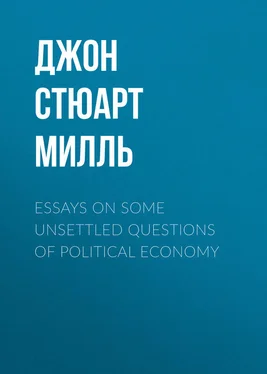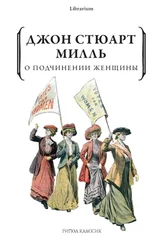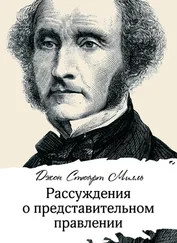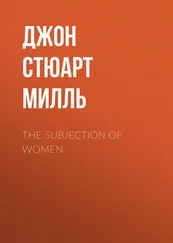Джон Милль - Essays on some unsettled Questions of Political Economy
Здесь есть возможность читать онлайн «Джон Милль - Essays on some unsettled Questions of Political Economy» — ознакомительный отрывок электронной книги совершенно бесплатно, а после прочтения отрывка купить полную версию. В некоторых случаях можно слушать аудио, скачать через торрент в формате fb2 и присутствует краткое содержание. Жанр: Философия, literature_19, foreign_antique, foreign_prose, на английском языке. Описание произведения, (предисловие) а так же отзывы посетителей доступны на портале библиотеки ЛибКат.
- Название:Essays on some unsettled Questions of Political Economy
- Автор:
- Жанр:
- Год:неизвестен
- ISBN:нет данных
- Рейтинг книги:4 / 5. Голосов: 1
-
Избранное:Добавить в избранное
- Отзывы:
-
Ваша оценка:
- 80
- 1
- 2
- 3
- 4
- 5
Essays on some unsettled Questions of Political Economy: краткое содержание, описание и аннотация
Предлагаем к чтению аннотацию, описание, краткое содержание или предисловие (зависит от того, что написал сам автор книги «Essays on some unsettled Questions of Political Economy»). Если вы не нашли необходимую информацию о книге — напишите в комментариях, мы постараемся отыскать её.
Essays on some unsettled Questions of Political Economy — читать онлайн ознакомительный отрывок
Ниже представлен текст книги, разбитый по страницам. Система сохранения места последней прочитанной страницы, позволяет с удобством читать онлайн бесплатно книгу «Essays on some unsettled Questions of Political Economy», без необходимости каждый раз заново искать на чём Вы остановились. Поставьте закладку, и сможете в любой момент перейти на страницу, на которой закончили чтение.
Интервал:
Закладка:
John Stuart Mill
Essays on some unsettled Questions of Political Economy
Of these Essays, which were written in 1829 and 1830, the fifth alone has been previously printed. The other four have hitherto remained in manuscript, because, during the temporary suspension of public interest in the species of discussion to which they belong, there was no inducement to their publication.
They are now published (with a few merely verbal alterations) under the impression, that the controversies excited by Colonel Torrens' Budget have again called the attention of political economists to the discussions of the abstract science: and from the additional consideration, that the first paper relates expressly to the point upon which the question at issue between Colonel Torrens and his antagonists has principally turned.
From that paper it will be seen that opinions identical in principle with those promulgated by Colonel Torrens (there would probably be considerable difference as to the extent of their practical application) have been held by the writer for more than fifteen years: although he cannot claim to himself the original conception, but only the elaboration, of the fundamental doctrine of the Essay.
A prejudice appears to exist in many quarters against the theory in question, on the supposition of its being opposed to one of the most valuable results of modern political philosophy, the doctrine of Freedom of Trade between nation and nation. The opinions now laid before the reader are presented as corollaries necessarily following from the principles upon which Free Trade itself rests. The writer has also been careful to point out, that from these opinions no justification can be derived for any protecting duty, or other preference given to domestic over foreign industry. But in regard to those duties on foreign commodities which do not operate as protection, but are maintained solely for revenue, and which do not touch either the necessaries of life or the materials and instruments of production, it is his opinion that any relaxation of such duties, beyond what may be required by the interest of the revenue itself, should in general be made contingent upon the adoption of some corresponding degree of freedom of trade with this country, by the nation from which the commodities are imported.
ESSAY I.
OF THE LAWS OF INTERCHANGE BETWEEN NATIONS; AND THE DISTRIBUTION OF THE GAINS OF COMMERCE AMONG THE COUNTRIES OF THE COMMERCIAL WORLD
Of the truths with which political economy has been enriched by Mr. Ricardo, none has contributed more to give to that branch of knowledge the comparatively precise and scientific character which it at present bears, than the more accurate analysis which he performed of the nature of the advantage which nations derive from a mutual interchange of their productions. Previously to his time, the benefits of foreign trade were deemed, even by the most philosophical enquirers, to consist in affording a vent for surplus produce, or in enabling a portion of the national capital to replace itself with a profit. The futility of the theory implied in these and similar phrases, was an obvious consequence from the speculations of writers even anterior to Mr. Ricardo. But it was he who first, in the chapter on Foreign Trade, of his immortal Principles of Political Economy and Taxation , substituted for the former vague and unscientific, if not positively false, conceptions with regard to the advantage of trade, a philosophical exposition which explains, with strict precision, the nature of that advantage, and affords an accurate measure of its amount.
He shewed, that the advantage of an interchange of commodities between nations consists simply and solely in this, that it enables each to obtain, with a given amount of labour and capital, a greater quantity of all commodities taken together. This it accomplishes by enabling each, with a quantity of one commodity which has cost it so much labour and capital, to purchase a quantity of another commodity which, if produced at home, would have required labour and capital to a greater amount. To render the importation of an article more advantageous than its production, it is not necessary that the foreign country should be able to produce it with less labour and capital than ourselves. We may even have a positive advantage in its production: but, if we are so far favoured by circumstances as to have a still greater positive advantage in the production of some other article which is in demand in the foreign country, we may be able to obtain a greater return to our labour and capital by employing none of it in producing the article in which our advantage is least, but devoting it all to the production of that in which our advantage is greatest, and giving this to the foreign country in exchange for the other. It is not a difference in the absolute cost of production, which determines the interchange, but a difference in the comparative cost. It may be to our advantage to procure iron from Sweden in exchange for cottons, even although the mines of England as well as her manufactories should be more productive than those of Sweden; for if we have an advantage of one-half in cottons, and only an advantage of a quarter in iron, and could sell our cottons to Sweden at the price which Sweden must pay for them if she produced them herself, we should obtain our iron with an advantage of one-half, as well as our cottons. We may often, by trading with foreigners, obtain their commodities at a smaller expense of labour and capital than they cost to the foreigners themselves. The bargain is still advantageous to the foreigner, because the commodity which he receives in exchange, though it has cost us less, would have cost him more. As often as a country possesses two commodities, one of which it can produce with less labour, comparatively to what it would cost in a foreign country, than the other; so often it is the interest of the country to export the first mentioned commodity and to import the second; even though it might be able to produce both the one and the other at a less expense of labour than the foreign country can produce them, but not less in the same degree; or might be unable to produce either except at a greater expense, but not greater in the same degree.
On the contrary, if it produces both commodities with greater facility, or both with greater difficulty, and greater in exactly the same degree, there will be no motive to interchange.
"If the cloth and the corn, each of which required 100 days' labour in Poland, required each 150 days' labour in England; it would follow, that the cloth of 150 days' labour in England, if sent to Poland, would be equal to the cloth of 100 days' labour in Poland: if exchanged for corn, therefore, it would exchange for the corn of only 100 days' labour. But the corn of 100 days' labour in Poland, was supposed to be the same quantity with that of 150 days' labour in England. With 150 days' labour in cloth, therefore, England would only get as much corn in Poland as she could raise with 150 days' labour at home; and she would, in importing it, have the cost of carriage besides. In these circumstances no exchange would take place.
"If, on the other hand, while the cloth produced with 100 days' labour in Poland was produced with 150 days' labour in England, the corn which was produced in Poland with 100 days' labour could not be produced in England with less than 200 days' labour; an adequate motive to exchange would immediately arise. With a quantity of cloth which England produced with 150 days' labour, she would be able to purchase as much corn in Poland as was there produced with 100 days' labour; but the quantity, which was there produced with 100 days' labour, would be as great as the quantity produced in England with 200 days' labour.
Читать дальшеИнтервал:
Закладка:
Похожие книги на «Essays on some unsettled Questions of Political Economy»
Представляем Вашему вниманию похожие книги на «Essays on some unsettled Questions of Political Economy» списком для выбора. Мы отобрали схожую по названию и смыслу литературу в надежде предоставить читателям больше вариантов отыскать новые, интересные, ещё непрочитанные произведения.
Обсуждение, отзывы о книге «Essays on some unsettled Questions of Political Economy» и просто собственные мнения читателей. Оставьте ваши комментарии, напишите, что Вы думаете о произведении, его смысле или главных героях. Укажите что конкретно понравилось, а что нет, и почему Вы так считаете.











